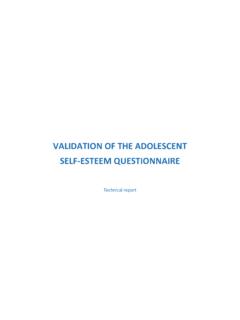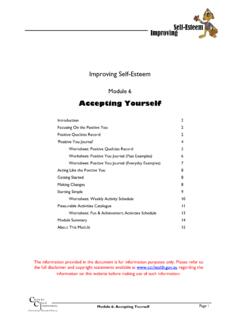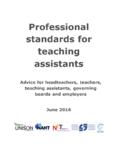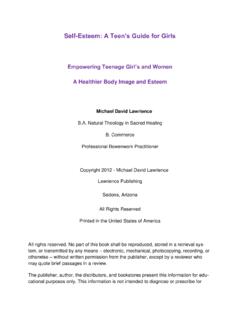Transcription of Self-Efficacy Beliefs and Teacher Effectiveness ...
1 Volume XXVI Number 1 Fall 2003 13 Self-Efficacy Beliefs and Teacher Effectiveness :Implications for Professional DevelopmentNikki Bray-ClarkReid BatesLouisiana Department of EducationLouisiana Department of EducationAbstractIn an era of increasing accountability demands for teachers and students professional development will be the keyto success in school reform initiatives as administrators struggle with improving the current teaching force. Researchhas shown that Teacher efficacy is an important variable in Teacher Effectiveness that is consistently related to teacherbehaviors and student outcomes. Furthermore, it has been shown that schools with high performance professionaldevelopment integrate key dimensions that support and reinforce skill development and efficacy Beliefs . It is thecontention of this paper that the framework of professional development for teachers should include Self-Efficacy as atheoretically sound focus of training designs aimed at improving Teacher competence and by extension improvingstudent changes necessary to promote meaningfuland substantive educational improvement are bothfundamental and systemic.
2 Because change and re-form in education continues to be at the politicalforefront, new challenges are emerging for policymakers and administrators across the country. Forexample, more challenging standards, high stakestesting, and school accountability are all pressuringadministrators to highlight the key linkage betweenteacher Effectiveness and student achievement. Thishas led to a rekindled emphasis on a timeless cer-tainty: if students are to achieve high standards thenno less can be expected of their teachers (NationalCommission on Teaching & America s Future, 1996).The result has been a renewed interest in the ongo-ing professional development of teachers, particu-larly high quality in-service training, and an accom-panying concern about how to design and deliverthis training in ways that improve teaching andlearning.
3 Indeed, creating stable, high-quality pro-fessional development experiences for teachers hasbecome a major concern as communities, states, andthe nation struggle with ways to improve the qualityof substance and outcomes of many currentteacher professional development opportunitieshave been soundly criticized suggesting the transfor-ation of current patterns is a critical challenge (Feist-ritzer, 1999). This paper argues that the Teacher Self-Efficacy is a key driver of Teacher Effectiveness andshould be explicitly included as a central focus in theprofessional development of teachers. We argue thatteacher in-service training should not only developand implement professional development activitiesaimed at building positive efficacy Beliefs but shouldalso use such Beliefs as an indicator of training suc-cess ( , a valuable outcome of training).
4 Researchsubstantiating the link between Self-Efficacy and tea-cher Effectiveness is briefly reviewed and sugges-tions are made about how Teacher developmentactivities, particularly in-service training, can be re-oriented to include the development of Teacher Self-Efficacy . Criticisms of Current In-Service Training PracticeAlthough conceptually the value of professionaldevelopment activities for overall improvements inteacher Effectiveness has been recognized, in practicethe capacity of current professional developmentmodels, particularly in-service Teacher training, toenhance Teacher Effectiveness has been limited. Thecontinuing professional development opportunitiesavailable to teachers have been criticized as generat-ing little or no improvement on subsequent studentlearning ( Department of Education, 1998). Pro-fessional development and in-service training effortshave tended to lack continuity across time.
5 For ex-ample, Senge (1990) notes that one serious deficiencyhas been school districts uncritical and fragmentedadoption of fads, fancies, and popular (but un-Nikki Bray-Clark & Reid Bates14 The Professional Educatorproven) innovations. This criticism is consistent withportrayals of in-service Teacher training as mass-marketed, flavor-of-the-month experiences that aredisconnected from one another and fail to build onprevious learning (Darling-Hammond, 1999). In-deed, the state of professional development formany teachers consists of disconnected, packaged-prescription one-shot workshops conducted on in-service days in which teachers passively attend tooutside experts instructing them on topics that dolittle to deepen their subject matter knowledge orteaching skill (Garet, Birman, Porter, Desimone, Her-man, & Yoon, 1999).
6 These efforts have offered littlecontinuity in building effective teaching practice,have not provided adequate opportunities for teach-ers to reflect on practice with knowledgeable col-leagues (WestEd, 2000), and have not been closelylinked to the content, activities, or challenges ofwhat teachers need to know and be able to do fortheir students (National Commission on Teaching &America s Future, 1996). As Mathew Miles puts it, A good deal of what passes for professionaldevelopment in schools is a joke one that we dlaugh at if we weren t trying to keep from In short, it s pedagogically na ve, a de-meaning exercise that often leaves its partici-pants more cynical and no more knowledgeable,skilled, or committed than before. (1995, p. viii)The bottom line is that teachers want and need prac-tical in-service activities that address their genuineneeds in the classroom, make them better teachers,and that improve student outcomes.
7 This must in-clude coherent, relevant coursework that is tied toreal-world practice and that includes learning expe-riences that build both Teacher competence and con-fidence (WestEd, 2000). We believe that using teach-er Self-Efficacy as an organizing concept aroundwhich Teacher in-service training can be designedand evaluated presents a viable and promisingmeans for advancing toward this Effectiveness and Self-Efficacy Teaching by its very nature involves solving ill-defined problems that are complex, dynamic, andnon-linear. Consequently Teacher Effectiveness islargely dependent on personal agency, or howteachers define tasks, employ strategies, view thepossibility of success, and ultimately solve the prob-lems and challenges they face. It is this concept ofpersonal agency the capacity of teachers to be self -organizing, self -reflective, self -regulating and proac-tive in their behavior that underlies the importanceof Self-Efficacy as a critical component in teachereffectiveness.
8 The link between personal agency anda Teacher s efficacy Beliefs lies in personal experienceand a Teacher s ability to reflect on that experienceand make decisions about future courses of Meaning of self -EfficacyThe construct of Self-Efficacy refers to an individ-ual s belief in his or her capability to organize andexecute the course of action required to manageprospective situations (Bandura, 1997, p. 2). It is atask-specific belief that regulates choice, effort, andpersistence in the face of obstacles and in concertwith the emotional state of the individual. The task-specific focus of Self-Efficacy distinguishes it frommore global concepts such as self - esteem or confi-dence. An individual s efficacy Beliefs are built fromdiverse sources of information that can be conveyedvicariously through social evaluation as well asthrough direct experience (Bandura, 1986).
9 Personal efficacy judgements have been found tohave substantial predictive power for performanceacross a range of tasks and behaviors (Stajkovic &Luthans, 1998). In addition, Self-Efficacy Beliefs areseen as important elements in many current views ofmotivation (Graham & Weiner, 1996). They have al-so been found to mediate a number of individualvariables relevant to Teacher Effectiveness such as jobsatisfaction, intention to quit the job, training and jobadjustment in newcomers (Saks, 1995), and the con-nection between conscientiousness and ongoinglearning (Martocchio & Judge, 1997). These andother characteristics of Self-Efficacy Beliefs suggestthe construct holds considerable promise for theimprovement of Teacher development Summary of Self-Efficacy ResearchTeacher Self-Efficacy studies began over twentyyears ago with the RAND researchers evaluation ofwhether teachers believed they could control the re- Self-Efficacy Beliefs and Teacher EffectivenessVolume XXVI Number 1 Fall 2003 15inforcement of their actions (Armor, Conry-Osegue-ra, Cox, King, McDonnell, Pascal, Pauly, & Zellman,1976).
10 The study of Teacher Self-Efficacy has evolvedover the years and has revealed a wealth of informa-tion indicating that Self-Efficacy may contribute toteacher Effectiveness in a number of ways. First,evidence suggests that positive Self-Efficacy beliefscan increase the extent to which teachers are willingto transfer skills learned during in-service training tothe classroom. For example, research on employeetraining has demonstrated that interventions aimedat raising Self-Efficacy with regard to specific futurebehaviors significantly increased the likelihood indi-viduals will exhibit those behaviors on the job (Eden& Kinnar, 1991). Research with teachers has shownthat those high in teaching Self-Efficacy tend to ex-plore more alternative methods of instruction, seekimproved teaching methods, and experiment moreextensively with instructional materials (Allinder,1994).



















